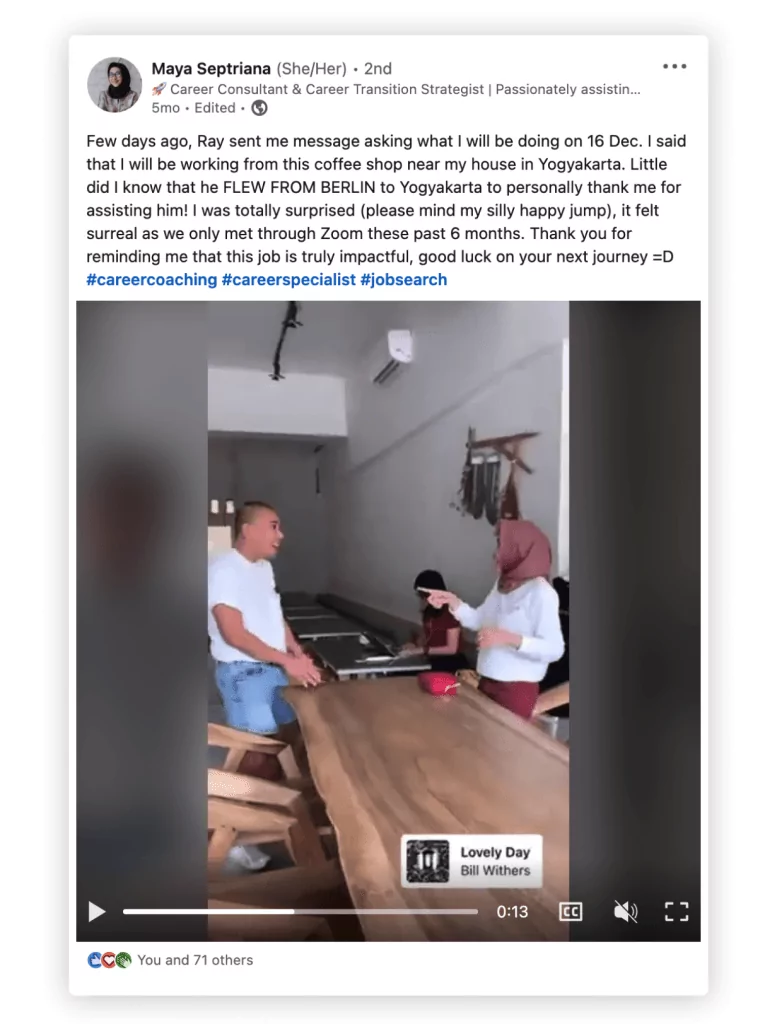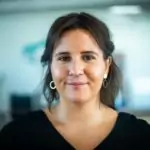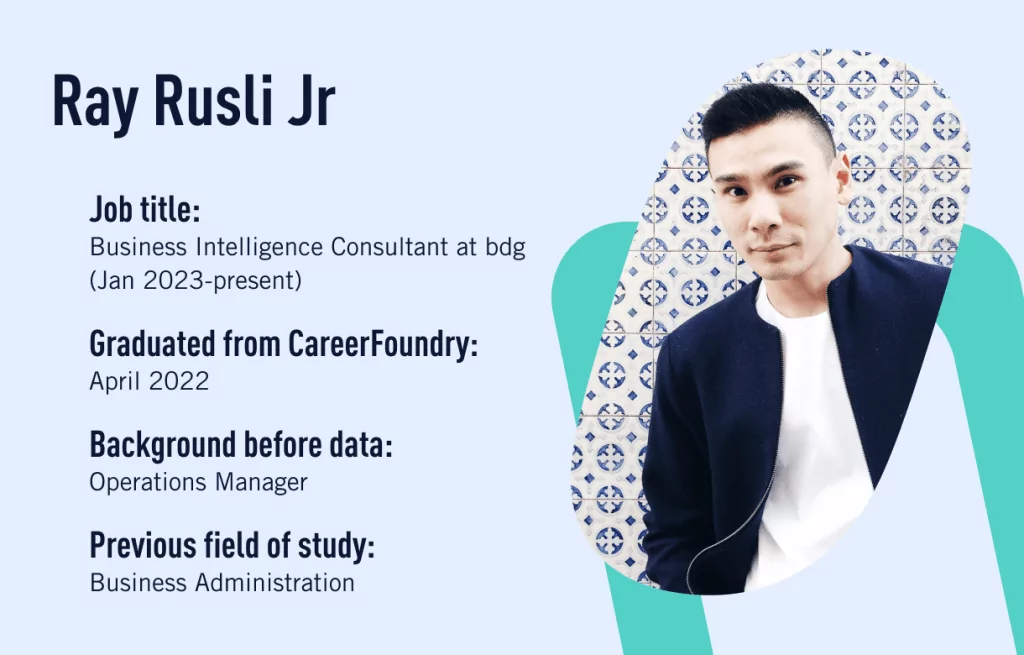
Operations manager at Dolce & Gabbana to business intelligence consultant at an international consultancy—it’s not the kind of career change story you hear every day! I was lucky enough to meet with CareerFoundry data analytics graduate Ray Rusli Junior to hear all about his bold career switch.
Stepping out of his comfort zone, being self-assured in interviews, and surprise visits to Indonesia are just some of the highlights that Ray had to share…
Hi Ray! Thanks for joining me today. Could you tell me a bit about yourself and your background?
My background is in fashion operations. I started working at COS, which is part of the H&M Group when I was studying for my BA in business administration. By the time I was about to do my master’s, I was asked to take part in an expansion project in Hong Kong.
I went for six months and was really involved in the whole project there—all the logistics and operational aspects. I was working on over 20 expansion projects worldwide. This experience helps me in my current job, actually. We’ll get to that later!
After that, I was headhunted by Dolce & Gabbana, and so I moved to a new role as the City Operations Manager, where I was responsible for the flagship stores and four concession stores in Berlin.
Wow, what a unique background! Why did you decide to make a career change?
Initially, it was the pandemic that made me realize I wasn’t heading in the right direction. I reached a certain age and I wondered if this was really something that I wanted to do for the next ten or twenty years.
And then something interesting happened. I was asked to attend an interview for another luxury brand in a higher position. I got asked to do a case study where I had to analyze data and make a presentation, and I had a lot of fun doing that!
I presented it in the interview and they loved it. They made me an offer, but I decided that it wasn’t the right thing for me. It’s really strange to think about that now: I got an offer for a higher position for a bigger luxury brand, but I declined it because I realized it wasn’t where I saw my future. I thought I’d find out more about data analytics instead.
Why did you decide to study with CareerFoundry?
I was already familiar with CareerFoundry. I did the five-day data analytics short course during lockdown. I liked it but I didn’t pursue anything further at the time—not until I had that interview and the realization that operations wasn’t a career I saw myself in in the long term.
I decided to stay in my current role at Dolce & Gabbana but start studying with CareerFoundry at the same time.
What was it like working and studying at the same time?
It went okay for the first few months but then things started to get rough. I decided to reduce my hours at work. I started working part-time, 30 hours a week, but with the same responsibilities.
But you know how operation processes can be, nothing ever goes exactly as planned. I was responsible for the whole region so I had to travel here, there, and everywhere. I didn’t really have the time to study.
I realized that I couldn’t do both at the same time anymore. I decided that I needed to make a sacrifice and so I quit my job. I don’t know if it was the right decision or not, but I had been preparing to leave the field for a while anyway by this point, and I had some savings.
A friend of mine told me in life you have to make decisions that you’re afraid of. It’s true; this is the only way for you to grow. Stay in your comfort zone and you won’t grow. I lived quite comfortably: the job was well paid and I could do it with my eyes closed by this point. This is probably a sign that it really didn’t excite me anymore!
That’s a good observation. What did you like the most about studying with CareerFoundry?
I enjoyed that it’s not a classroom culture. I like to study by myself and understand things in my own time.
I also like the structure of the program: do the task, read the supporting material, check it over, and send it to your tutor or mentor for feedback. I really enjoyed the one-on-one feedback, because here’s the thing: sometimes I would do a presentation and think: “This is the best presentation of my life!” and then my tutor would say, “Why did you use this graph?” or “Why didn’t you use a scatter chart?” and I would realize what I could improve.
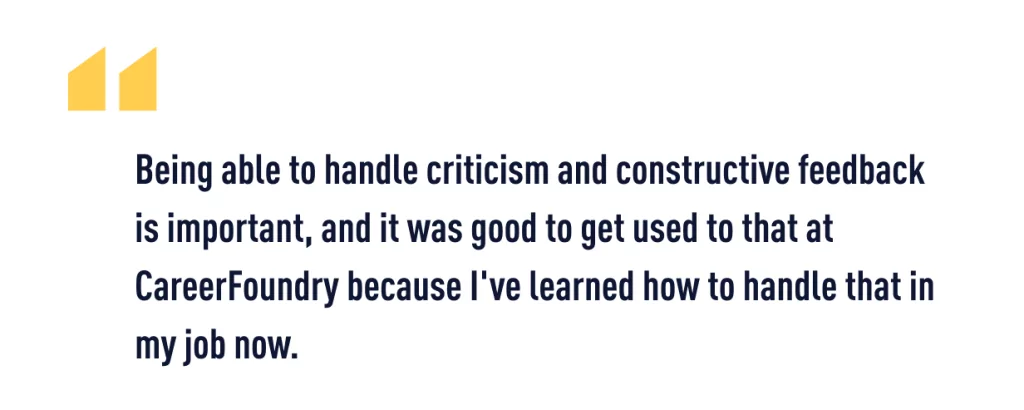
Yes, feedback from a mentor is great because they’ll notice things about your work and your style that you couldn’t even see yourself!
Yes. A funny thing about my first career specialist at CareerFoundry is that he told me early on that I should be a consultant. And here I am at a consulting firm! And loving it.
Do you know what he saw in you that made him think you’d be a good consultant? Whether it was your skillset, a personality trait, or your mindset, perhaps?
A mix of everything, I think. My own interpretation of consulting is this: If I have a problem, I usually go to my friends and talk about it and they will give me advice. I like to see consulting the same way; it’s about helping people.
Of course, there are many variations, such as management consulting, or business intelligence—like bdg where I work now. If a company wants to improve its productivity, its reporting, or its analytics, for example, they come to us and we work across teams to implement the relevant software and processes.
I think my skillset is useful in different ways at bdg. I’m a good conversationalist, but also good with analytical tools like SQL and Excel, thanks to all the training that I’ve done with CareerFoundry!
Pleased to hear it! And a good insight into your new career. Let’s talk about how you got the job at bdg. What happened after you finished the Data Analytics Program?
I was traveling for quite a long time after graduating actually, enjoying some time off! While I was in Indonesia I even planned a surprise visit to see Maya (my career specialist from CareerFoundry). It was the first time we met in person!
Check out the full LinkedIn post from Maya to watch the video.
Traveling was a very humbling experience too. I started to prioritize important things in my life. I learned how to meditate. I decided to find joy in the simple things. And then I started applying for jobs.
How did you prioritize your new career after traveling?
I set goals. I told myself I was going to get a job by November, which would be six months after finishing the CareerFoundry program. The job search was quite a bumpy experience and I went through a lot of interviews. Even Maya said it was a lot. Of course, they didn’t always work out but you can always learn something from an interview.
There was one interview where I was very nervous. I knew the answers, but I couldn’t explain myself properly because of my nerves. I put too much pressure on myself and didn’t have the right mindset going into that interview.
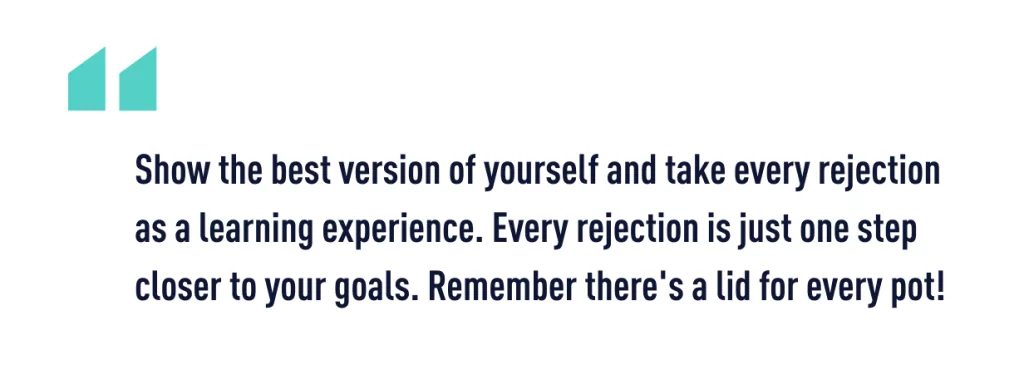
I had five different interviews in one week and one of them was bdg. I started to see things differently by this point. I wasn’t thinking about getting a job; I was trying to think how to present the best version of myself to this company so they’d want to work with me.
I was thinking more like, “How can I rock my presentation?” Looking at it like that took the pressure off. Ultimately, bdg was the only company that tried to understand me as a person, and I knew I wanted to work for them.
Can you explain what you mean by that?
Well, the first thing the HR manager checked was how my personality would fit within the team, unlike other companies that would go through all my documentation first. One company even asked to see my high-school diploma—I’m nearly 40 and didn’t understand why it was relevant compared to my CareerFoundry certificate!
The HR manager at bdg tried to understand my motivations to join the company before I moved on to the case study and technical interview.
Sometimes I was waiting two or three weeks to hear the next steps from other businesses, regardless of whether they were moving forward with me or not. Whereas at bdg, in the middle of the first interview, the HR manager had already set up the meeting for the second stage. She took it seriously, and that was what I wanted. A company that prioritized me and was clear on the process.
I see. I’m pleased you had such a positive experience with bdg! How was the rest of the hiring process?
I had to prepare a case study for the second interview. I was used to preparing presentations thanks to my previous job. At COS, I had to do presentations about really dull things like the stockrooms, and so I had experience trying to make people interested in something while presenting! I took the same approach with bdg. I tried to make it fun, but still technical.
It went well, and I was hired on the spot during that presentation! They made me an offer in person, and the official offer letter came through the next day!
I wanted to work for this company because they appreciated my time. Respect goes both ways, especially during the job search, and I appreciated that from bdg. I feel very welcome here.
Congratulations! That’s quite a story! What is it like starting a new role straight after CareerFoundry?
There’s a lot to learn! At the moment I’m working with four different clients at bdg. One of them is Zalando, a fashion retailer, and there’s also REWE, a supermarket chain. There’s also an energy company and a housing association. Other bdg clients include companies like Siemens Energy, KFC, and s.Oliver. It’s very broad. So you can imagine how different the work is for each client!
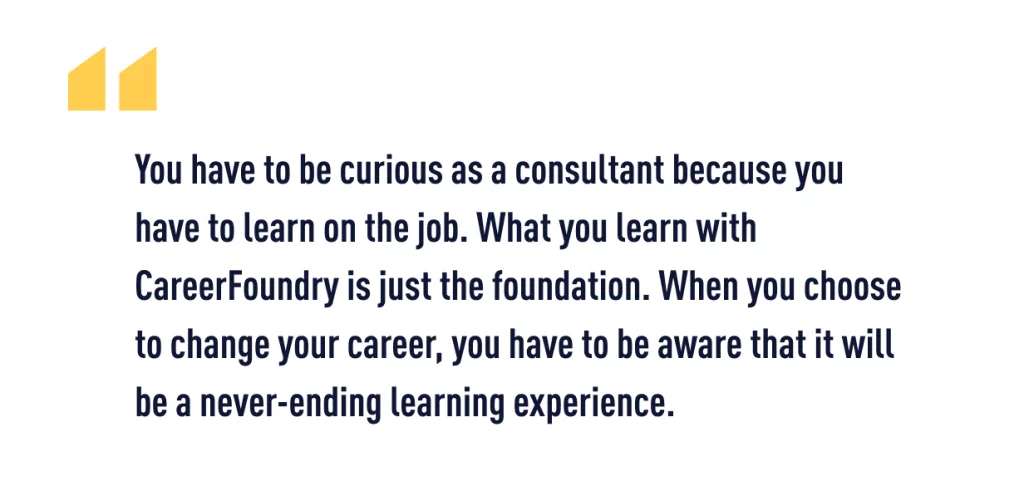
Hear from one of Ray’s colleagues and learn how he’s getting on at bdg in this article: Life After CareerFoundry: Updates on Web Development and Data Grads in the Workplace
What advice would you give someone who’s starting out in a new career?
You need to be humble. You are going to meet people who are just graduating from university, and they’re on a different path than you.
I have to be honest, in the beginning, I was quite shocked because younger people were teaching me how to do my job. But I’ve learned that the soft skills from my previous job are incredibly valuable.
For example, when I was doing expansions for the H&M Group I was being thrown all over the world and had to set up teams that could function immediately. So I became very good at building connections with people. That’s helped me a lot in my new job working with so many different clients.
What’s a typical day like for you?
What I like about consulting is that so far no two days have ever been the same. That being said, I usually start each day by checking my email and my calendar. I have to be honest, consulting is a lot of meetings—some days are eight hours straight of meetings.
Otherwise, I’ll check my project progress and tickets in Jira, the project management tool. Time management is very important when you’re juggling so much. I set myself 45 minutes to do one task. After that, if I don’t finish it either I jump to the next task regardless, or I stay and finish the task if it’s crucial.
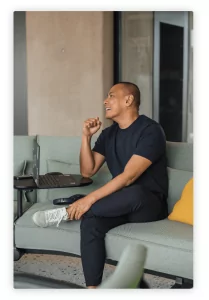
How do you find your new career coming from an unrelated background? Do you think it’s possible to get a job in data analytics, or in your case business intelligence if you have a very different background?
I do think it’s possible. I think when bdg saw my CV they also saw my potential to learn. I think you need to get to the interview first and try to convince them that you are the right fit as a person.
In terms of getting the interview in the first place, I think the only way to do it is by pimping your CV and trying to put as many keywords in your cover letter or application as possible. That’s what Maya taught me.
What’s been the steepest learning curve in your journey so far?
The first month I was so unsure whether consulting was the right job for me because I was bombarded with so much information. I think it’s normal to feel this way though. Something that feels like imposter syndrome accompanies you on the journey too. But I tell myself that if I feel this way (dealing with imposter syndrome) it means I’m being put in challenging situations and that’s a good thing because it forces me to grow.
With every day on the project, the feeling gradually decreases as I continually learn and get more confident. Plus, I’m not alone on my journey as I have a really experienced team surrounding me.
I came from a previous position where I had to onboard people and make up a team, but now I’m in a completely different position and I’m the one learning. That was a hard thing to accept, but I’m getting used to it. I actually like it now!
And what’s the most rewarding thing about your job?
Making impactful changes. Say there’s a long-term project for a client, as a consultant you are the first to visualize the results and see the difference you can make.
With business intelligence, you can save so much time and money improving your processes and it can have a huge effect on the company. Consulting firms like bdg can bring you solutions you didn’t even know were possible and save you endless hours of extra work and energy.
Where do you see your future? Would you like to stay in consulting?
I like consulting because you get a taste of all industries. After graduating from CareerFoundry you might not know which industry you want to work in or who you want to work for. The good thing about consulting is that you’re exposed to lots of industries and you get to meet and work with lots of different types of people.
For example, the energy company is very different from Zalando! That helps me learn more about each industry, and where I could see myself in the future. I think consulting is a good stepping stone—but not for quite some time as I really enjoy what I do now!
Thank you for sharing your story with me, Ray. You’ve had quite the journey and I wish you all the best for your future career!
If you’ve been inspired by Ray’s story, and are thinking about changing careers too, CareerFoundry is here to help. Book a call with an expert program advisor to figure out if studying with CareerFoundry is right for you, or try out a free introductory short course to get a taste of what it’s like to work in tech.
For more information on changing careers, check out these resources:
- How To Successfully Change Careers in 2024: Your Step-by-Step Guide
- Changing Career Paths: Ally’s Journey From Landscape Architecture to Product Design
- Starting a New Career at 30: How Julian Became a Data Analyst
